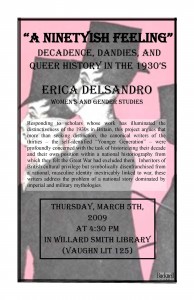Responding to scholars whose work has illuminated the distinctiveness of the 1930s in Britain, this project argues that more than seeking distinction, the canonical writers of the thirties – the self-identified “Younger Generation” – were profoundly concerned with the task of historicizing their decade and their own position within a national historiography from which they felt the Great War had excluded them. Inheritors of British cultural privilege but symbolically disenfranchised from a national, masculine identity inextricably linked to war, these writers address the problem of a national story dominated by imperial and military mythologies.
